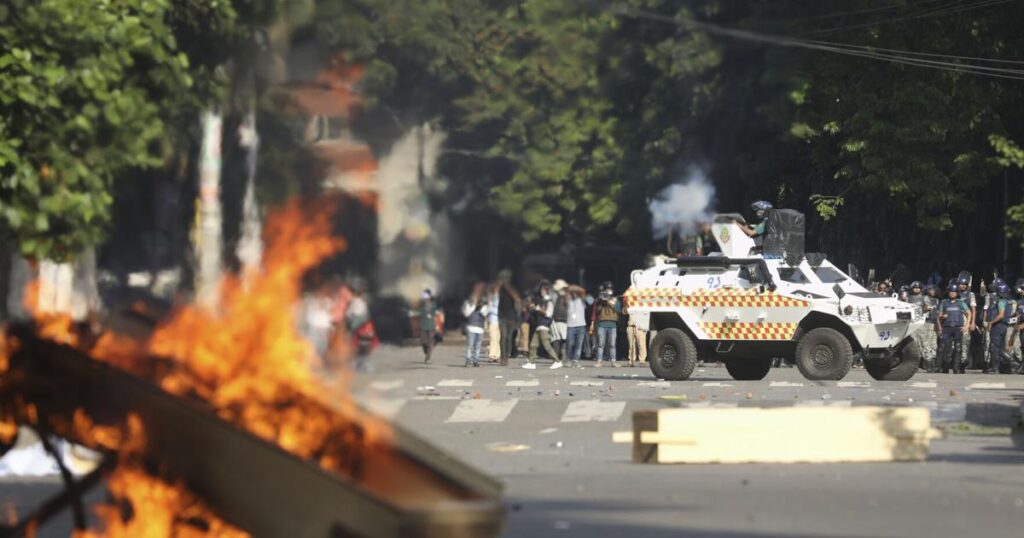DHAKA, Bangladesh (AP) — Police clashed Thursday with student protesters trying to put Bangladesh’s capital on a “total lockdown,” after days of violent clashes during demonstrations over the government’s job allocation system that left 10 people dead across the country, according to media reports.
Prothom Alo, a major Dhaka-based newspaper with a strong network of journalists across the country, said it had received reports that 10 people were killed in the violent violence in Dhaka and other parts of the country. The Daily Star, the country’s leading English-language newspaper, reported that at least seven people were killed.
Officials did not immediately confirm the figures.
Prothom Alo said at least six people were killed in Dhaka’s Uttara district alone in clashes between protesters, security officials and ruling party activists.
The headquarters of Bangladesh’s state-run television station was attacked, with protesters smashing open the main gate and setting fire to the reception desk and vehicles, a news producer and a reporter told The Associated Press by phone on condition of anonymity for fear of being attacked.
“I jumped over the wall to escape but some of my colleagues were trapped inside. The attackers entered the building and set furniture on fire,” the producer said by phone. Television continued broadcasting, but some Dhaka residents said they could not receive the station’s signal at home.
Students have been demonstrating for weeks against a government quota system that they say favours allies of the ruling party, but protests have intensified since violence broke out on the Dhaka University campus on Monday between demonstrators, police and pro-government student activists. Six people were killed on Tuesday, leading the government to ask universities across the country to close and police to raid the headquarters of the main opposition party.
As violence continued on Thursday, Bangladesh’s Law Minister Anisul Haq said in the afternoon that Prime Minister Sheikh Hasina had asked him to talk to the protesters and that he was ready to talk on Thursday if the protesters agreed.
On Wednesday night, protesters announced a “total lockdown” across the country on Thursday in response to security forces continuing to attack demonstrators on campuses. The opposition Bangladesh Nationalist Party said it would do everything it could to make the lockdown a success.
Clashes continued as protesters tried to enforce the blockade Thursday morning. In Dhaka’s Uttara district, police chased hundreds of chanting protesters who had blocked roads. Elsewhere, police fired tear gas and charged with batons to disperse protesters, who responded by hurling stones. A Dhaka Metropolitan Police spokesman said dozens of people, including police officers, were injured in the violence.
Police said protesters attacked and set fire to a traffic police box and damaged a police vehicle as clashes continued across the city.
Traffic was light on Dhaka’s usually congested roads on Thursday morning and many shopping malls were closed. Offices and banks were open but commuters complained of limited access. Police set up checkpoints at the entrance to Dhaka University.
Local television reported violence in other cities including Chittagong and Khulna, and protesters also blocked several major highways.
Salma Rahman, an employee at a financial institution in Dhaka, said he had left his car at home and got on a motorbike. “Authorities have warned us to stay safe on the streets as there may be violence during the shutdown.”
Protesters are demanding the end of the quota system that reserves up to 30 percent of government jobs for families of veterans who fought in Bangladesh’s 1971 war of independence. They say the system is discriminatory and favours supporters of Prime Minister Sheikh Hasina, the Awami League party that led the independence movement, and they want it replaced with a meritocratic system.
Hasina’s government suspended quotas following massive student protests in 2018. But last month, Bangladesh’s High Court quashed that decision and reinstated the quotas after a petition was filed by the families of 1971 army veterans, triggering the recent demonstrations. The Supreme Court then stayed the High Court ruling and is due to hand down its verdict on August 7. The government is also appealing the High Court ruling in the wake of the protests, according to the attorney general’s office.
Haq said the government was seeking an expedited hearing.
“I have already asked the attorney general to appeal to the Supreme Court on Sunday for an early hearing,” he told reporters. The Supreme Court was due to rule on the quota issue on August 7. Friday and Saturday are weekend days in Bangladesh. The court sits on Sunday.
“I ask everyone to wait patiently until the verdict is released,” Hasina said in a televised address on Wednesday night. “I am confident that the students will get justice from the Supreme Court. They will not be disappointed.”
While job opportunities are expanding in Bangladesh’s private sector, many people prefer civil service jobs because of their stability and high salaries. Every year, about 400,000 graduates compete in the civil service exam for 3,000 jobs.
Prime Minister Hasina said a judicial investigation would be held into Tuesday’s deaths and vowed that those responsible would be brought to justice.
“Precious lives have been lost needlessly,” she said. “I condemn all killings.”
Volker Turk, the UN High Commissioner for Human Rights, posted on X that all acts of violence and the use of lethal force must be investigated and perpetrators held accountable. Turk said freedom of expression and peaceful assembly are fundamental human rights.
Bangladesh’s ruling party blamed the BNP for the unrest, and Dhaka police searched its headquarters late Tuesday. Detective chief Harun Oru Rashid said police had arrested seven members of the party’s student wing and that investigators had found 100 crude bombs, 500 wooden and bamboo sticks and five to six bottles of gasoline in the search.
BNP leader Ruhul Kabir Rizvi said the attack was an attempt by the government to divert attention from the protests.



